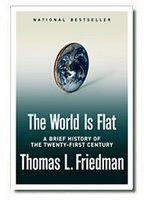 I got behind on my reading and built a pretty big stack next to my bed. Then I caught up with my reading, but now I have gotten behind on writing about what I read. The longer I wait the harder it is to write about the book.
I got behind on my reading and built a pretty big stack next to my bed. Then I caught up with my reading, but now I have gotten behind on writing about what I read. The longer I wait the harder it is to write about the book.A couple of weeks back, I finished Thomas L. Friedman's The World Is Flat, A Brief History of the Twenty-First Century (New York: Farrar, Straus and Giroux, 2005).
What is the author talking about when he refers to a flat world? If you own a Dell computer and have ever called tech support and spoken to someone in India, you have experienced a flat world. If you drive a Toyota made in America, you have experienced a flat world. If you have shopped at Walmart, you have experienced a flat world. Friedman does an amazing job of explaining the changes in technology, global trade and economics that have changed everything about how business in done around the world. He then does an amazing job of explaining why this matters.
If you really want to have a better perspective about how the modern world works economically and geo-politically this book is a must read. Whether or not you personally agree with Friedman philosophy, you have to agree that this book was researched incredibly well.
Ok, so why does a pastor, who should be reading Bible and theology, have such an interest in this book? I believe as Christians, we are called to take we believe and understand about God and Jesus, things we learn from scripture and prayer and discernment and let those things affect every aspect of our lives. As we reflect on what is happening in the world, as we make choices as consumers and we weigh in on political and social issues, we do so in the context of our faith. This requires two things: first that we take our faith seriously, second that we inform ourselves about the issues.
Let me give an example. I am a Christian and a consumer. I buy food, clothes, gasoline and lots of other stuff. As a Christian and a consumer, I have a moral obligation to consider where I shop and what I buy. Do I spend my money at a store that treats its employees well, that buys from suppliers who treat their employees well and treat the environment well? Am I spending my money responsibly or in my effort to save money am I contributing to the mistreatment of employees or even the planet?
To really make these decision well, we need to be informed. Sometimes we make well intentioned decisions based on a lack of information. For instance, I might decide to not by clothing from a certain store because I hear it is made in a foreign country in a factory that only pays their workers $10 a day. That seems unfair. However, what I may not know is that $10 is twice or three times the going wage in that country and that the company who has set up shop there is contributing to the country's infrastructure and giving the entire country an opportunity to begin to climb the ladder of economic opportunity.
This is all a long way of saying, good book. Give it a read if you get a chance.
peace,
will
No comments:
Post a Comment